人教版七年级上册英语动词第三人称单数形式的练习
七年级英语第三人称单数练习题

七年级英语第三人称单数练习题一、写出下列动词第三人称单数的变化形式:be —— have —— come----- go-----stay ----, teach---- , write ----, take---- , study---- , watch----- , fly----- ,play------ 二、用括号中所给词的适当形式填空;1(The buses ____ (use) a lot of oil.(Each of us ____ (have) strong points and weak points. 23(My daughter___ (watch) TV every day. Sometimes she ___ __ (see) afilm on Sunday.4(Li Wei__ (have) a daughter. She___(stay)in a nursery(托儿所).(Our family ___ (be) a happy one. 56(Her mother ______ (teach) English at a middle school. 7(Jack often_______ (listen) to the radio. 8(He ___ (say) that Prof. Li ___ (be) tired. 三、将下列句子变成否定式和一般疑问句:1(Her name is Mei Ling.2(We go to evening school at night.3(My brother works in a radio factory.4(You have a red pencil.5(She has lunch at home.6(We have a meeting once a week.四、单项选择:1. The Browns___a nice car and Brown's brother __ a nice jeep.A. have /haveB. has/hasC. have/hasD. has/have 2. If theirhouse___not like ours, what___ it look like?A. is/isB. is/doesC. does/doesD. does/ is___ you think he will come? - If it ___ tomorrow, he 3. -will not come.A.Do/rainsB.Are/rainsC.Do/will rainD.Are/will rain 4. The little child__ not even know that the moon __ aroundthe earth.C. does / movesD. did / moved A. do / move B. do / moves2)用所给的人称改写句子1.I take photos on Sunday. ( Mike)2.We grow beautiful flowers. (she)3.They like collecting stamps. (Ben)4.I listen to music carefully. (my aunt)5.You like making a model ship. (Helen)6.We clean the classroom every day. (he)7.They look after the pandas. (Mr Wang)8.I draw a tree and some flowers. (Nancy)9.We go to bed at eight. ( my sister)10.I read newspapers in the evening. (Mr Green) Hello! I'm Tommy I'm from American boy(Now I live in China with my parents and my sister(We like China and Chinese food(Chinese food is good for our health(We usually haveeggs and noodles(面条)for breakfast(For lunch we have rice, vegetables, chicken and a bowl of soup(Sometimes we have some dumplings(饺子)for dinner(We don't like fast food like hamburgers and French fries(They are unhealthy food(1(Where is Tommy from?A(America B(China C(Canada2(What do Tommy’s families have for breakfast?A(Eggs and noodles B(Eggs and vegetables C(Chicken and vegetables 3(They like Chinese food because ((it is good for their health AB(it is very delicious(可口的)C(it is beautiful4(Do they like fast food?A(Yes, they do( B(No, they don't C(It's not mentioned((提起)5(文中unhealthy的反义词是 (A(healthy B(interesting C(boring8. Dear Amy,Paul is my pen pal(He is from Landon,England(He speaks good English(He is now in Shanghai with his parents,because they work in Shanghai(Paul can speak a little Chinese!There are five people in his family,his parents,his two sisters and he(His sisters aren't in China(They are in England now(He likes singing and dancing very much(His favorite subject is music(He likes going to the movies on weekends:He thinks it is fun(I think he is a nice boy(Yours,Sam 1(Paul is Sam's (A(brother B(cousin C(pen pal D(teacher 2(Where does Paul live now? A(In Beijing( B(In Shanghai(C(In London( D(In New York(3(How many brothers and sisters does Paul have?(He has two brothers and one sister( AB(He has two sisters and one brother( C(He has two brothers and no sister(D(He has two sisters and no brother((What’s Paul’s favorite subject in school? 4A(Math B(Chinese C(English( D(Music( (Which of the following is TRUE(正确的)in this letter? 5A(Paul is from China(B(Paul is in Shanghai with his whole family( C(Paul Likes going to the movies on weekends( D(Paul speaks good Chinese(。
(人教版2024新版)七年级上册 Unit 2 We're Family! 知识点+练习卷(含答案)
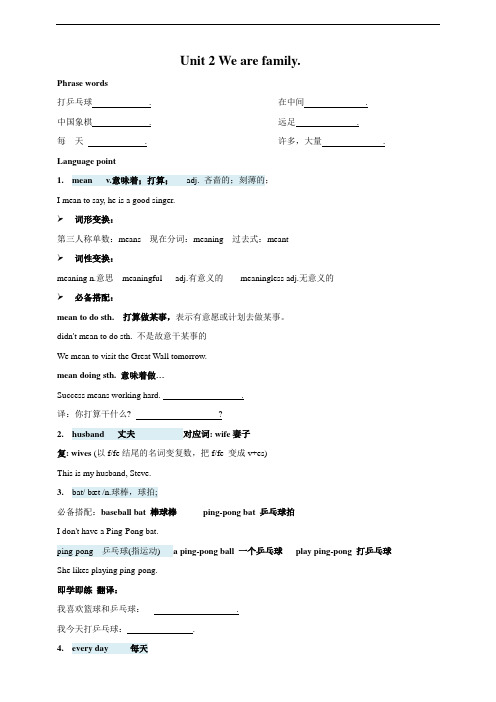
Unit 2 We are family.Phrase words打乒乓球. 在中间.中国象棋. 远足.每天. 许多,大量. Language point1.mean v.意味着;打算;adj. 吝啬的;刻薄的;I mean to say, he is a good singer.➢词形变换:第三人称单数:means 现在分词:meaning 过去式:meant➢词性变换:meaning n.意思---meaningful adj.有意义的---meaningless adj.无意义的➢必备搭配:mean to do sth. 打算做某事,表示有意愿或计划去做某事。
didn't mean to do sth. 不是故意干某事的We mean to visit the Great Wall tomorrow.mean doing sth. 意味着做…Success means working hard. .译:你打算干什么? ?2.husband 丈夫对应词: wife妻子复: wives (以f/fe结尾的名词变复数,把f/fe 变成v+es)This is my husband, Steve.3.bat/ bæt /n.球棒,球拍;必备搭配:baseball bat 棒球棒ping-pong bat 乒乓球拍I don't have a Ping-Pong bat.ping-pong 乒乓球(指运动) a ping-pong ball 一个乒乓球play ping-pong 打乒乓球She likes playing ping-pong.即学即练翻译:我喜欢篮球和乒乓球:.我今天打乒乓球:.4.every day 每天She's late for work every day. They walk their dogs every day.辨析:every day与everydayeveryday作形容词,表示每天的,或日常的Smart phones have become part of everyday life .every day是副词,表示每一天,用于一般现在时态She goes to school every day.5.together 在一起,共同;get together相聚; 集合; 聚集We went everywhere together.We ate lunch together every day.即学即练:我们一起唱了一首歌: .5.spend度过,花(时间);花(钱)词形变换:第三人称单数spends 现在分词spending 过去式spentThey want to spend the night by themselves.必备搭配:sb spends time (money) on sth. (介词on后接名词或代词)sb spends time (money)(in)doing sth.(此时动词要用动词-ing形式,介词in可以省略)I spend too much time watching television.Andy spent a lot of money on books. Andy。
(完整版)初一英语动词第三人称单数形式的练习
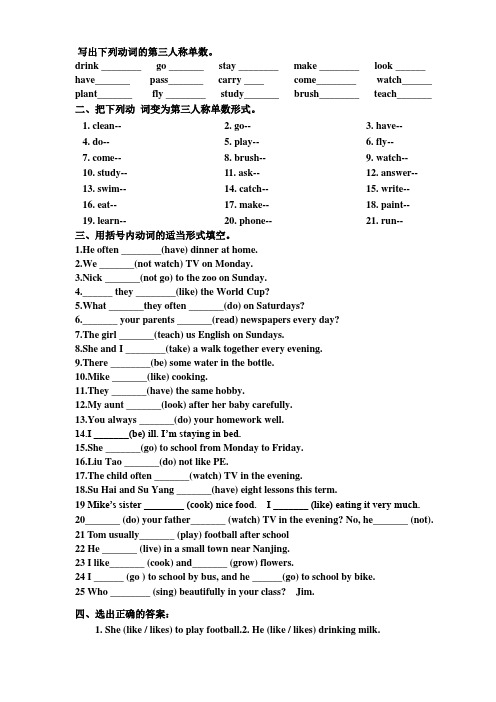
写出下列动词的第三人称单数。
drink ________ go _______ stay ________ make ________ look ______ have_______ pass_______ carry ____ come________ watch______ plant_______ fly ________ study_______ brush________ teach_______二、把下列动词变为第三人称单数形式。
1. clean--2. go--3. have--4. do--5. play--6. fly--7. come-- 8. brush-- 9. watch-- 10. study-- 11. ask-- 12. answer-- 13. swim-- 14. catch-- 15. write-- 16. eat-- 17. make-- 18. paint--19. learn-- 20. phone-- 21. run--三、用括号内动词的适当形式填空。
1.He often ________(have) dinner at home.2.We _______(not watch) TV on Monday.3.Nick _______(not go) to the zoo on Sunday.4.______ they ________(like) the World Cup?5.What _______they often _______(do) on Saturdays?6._______ your parents _______(read) newspapers every day?7.The girl _______(teach) us English on Sundays.8.She and I ________(take) a walk together every evening.9.There ________(be) some water in the bottle.10.Mike _______(like) cooking.11.They _______(have) the same hobby.12.My aunt _______(look) after her baby carefully.13.You always _______(do) your homework well.14.I _______(be) ill. I’m staying in bed.15.She _______(go) to school from Monday to Friday.16.Liu Tao _______(do) not like PE.17.The child often _______(watch) TV in the evening.18.Su Hai and Su Yang _______(have) eight lessons this term.19 Mike’s sister ________ (cook) nice food. I _______ (like) eating it very much.20_______ (do) your father_______ (watch) TV in the evening? No, he_______ (not).21 Tom usually_______ (play) football after school22 He _______ (live) in a small town near Nanjing.23 I like_______ (cook) and_______ (grow) flowers.24 I ______ (go ) to school by bus, and he ______(go) to school by bike.25 Who ________ (sing) beautifully in your class? Jim.四、选出正确的答案:1. She (like / likes) to play football.2. He (like / likes) drinking milk.3. I (like / likes) to watch TV.4. We (like / likes) to play badminton.5. They (like / likes) to sing songs.6. She (read / reads) books every day.7. He (play / plays) computer games every day.8. It (listen / listens) to the radio every day.9. Linda (draw / draws) pictures every day.10. Jane and Linda (play / plays) football every day.五、选择题:1. I to school every day.A. goB. goesC. going2. He teeth every morning.A. brushB. brushesC. brushing3. The birds singing.A. likeB. likesC. like to4. What does Lily doing?A. likeB. likesC. to5. you like eating apples?A. DoB. DoesC. Doing6. he swim every afternoon?A. DoB. DoesC. Doing7. Tom likes in the classroom.A. singingB. singC. to singing8. –Does Sally like swimming?--No, she .9. Peter and Mary milk every day.A. drinkB. drinkingC. drinks10. they read English every day?A. DoesB. ToC. Do六、把下列句子变为否定句:1. She draws pictures every day.2. We like playing football.3 Linda swims every day.4 They like playing games.5. My father reads newspaper in the evening.6. He likes drawing pictures .__________________________________________________________________七、把下列句子变为疑问句,并做肯定回答。
新人教版初中英语七年级Unit 5 练习
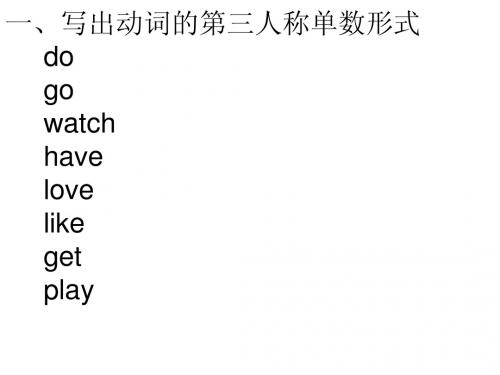
No, I don’t. Soccer is difficult. I like ping-pong. It’s easy for me. I have three ping-pong balls and two ping-pong bats. After class, I play ping-pong with my classmates. No, He doesn’t. Soccer is difficult. He likes ping-pong. It’s easy for him. He has three ping-pong balls and two ping-pong bats. After class, He plays ping-pong with his classmates.
对划线部分提问: 1 She has a very nice watch. _____ ____ he ____ ? 2 Gina likes her new skirt. _____ _____ Gina _____ ? 3My teacher plays baseball every day. _____ _____ your teacher ____ every day. 1 What does have 2 What does like 3 What does do
一写出动词的第三人称单数形式dogowatchhavelovelovelikegetplay二写短语打排球打篮球踢足球让我们一起看电视课后想打篮球playvolleyballplaybasketballplayfootballletuswatchtvafterclasswanttoplaybaseball如此困难如此容易玩电子游戏在同一所学校在不同学校里在电视上和
七年级上册英语动词语法填空
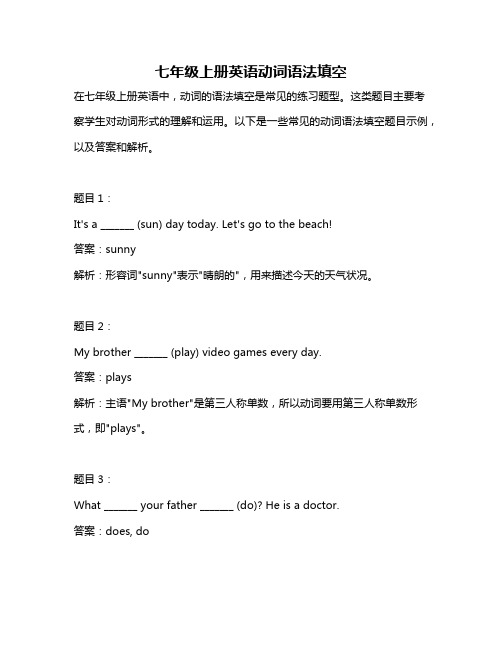
七年级上册英语动词语法填空在七年级上册英语中,动词的语法填空是常见的练习题型。
这类题目主要考察学生对动词形式的理解和运用。
以下是一些常见的动词语法填空题目示例,以及答案和解析。
题目1:It's a _______ (sun) day today. Let's go to the beach!答案:sunny解析:形容词"sunny"表示"晴朗的",用来描述今天的天气状况。
题目2:My brother _______ (play) video games every day.答案:plays解析:主语"My brother"是第三人称单数,所以动词要用第三人称单数形式,即"plays"。
题目3:What _______ your father _______ (do)? He is a doctor.答案:does, do解析:特殊疑问词"what"引导的疑问句,需要用助动词"does"来构成疑问语气,同时动词要用原形,即"do"。
题目4:The little girl _______ (like) pandas very much.答案:likes解析:主语"The little girl"是第三人称单数,所以动词要用第三人称单数形式,即"likes"。
题目5:My family _______ (watch) TV at night.答案:watches解析:主语"My family"是第三人称复数,所以动词要用第三人称复数形式,即"watches"。
希望以上内容对您有帮助,如果您还有疑问,建议查阅教辅或询问老师。
七年级上册英语动词第三人称单数形式的练习

七年级上册英语动词第三人称单数形式的练习Drink - drinksGo - goesStay - XXXMake - XXXLook - looksHave - hasPass - passesCarry - carriesCome - comesWatch - watchesPlant - plantsFly - fliesStudy - studiesXXX - XXXXXX - XXX1.Does he watch TV at night。
Yes。
he does.2.Do you go to school every day。
No。
I don't.3.Do Jack and Peter like apples?4.Does XXX go swimming on Sunday?5.Do they play football。
Yes。
they do.6.Do we have a good teacher。
Yes。
we do.7.Do they jump rope。
No。
they do not.8.Does your dog walk in the zoo?9.Do I have a big nose。
No。
you do not.10.Do your cats eat fish。
Yes。
they do.11.Do their mothers go shopping。
No。
they do not.12.I do not speak Japanese。
Do you speak Japanese?1.I have a cat.2.She has a beautiful garden.3.They have a big house.4.He has two cars.5.We have a lot of homework.6.You have a nice smile.7.XXX has us food.8.She has a new job.9.They have a cute baby.10.He has a good sense of humor.1.I drew a nice picture.2.He is a good friend.3.XXX.4.XXX.5.XXX.6.XXX.7.Her XXX got a vase.8.Our teacher read an English book.9.Our XXX XXX.XXX.11.Nancy has many skirts.12.David has some jackets.13.XXX.14.What do you want?15.What does Mike have?16.What do your friends like?17.What does Helen want?18.His XXX.19.Her sister has a nice doll.20.Miss Li read an English book.否定句:1.She doesn't do her homework every day.2.XXX't live in Shanghai.3.XXX.4.Danny hasn't seen the apple tree.5.XXX.一般疑问句:1.Does the desk have four legs。
七年级英语-动词第三人称单数练习一

动词第三人称单数一、写出下列单动词的第三人称单数形式brush_________ watch _______ guess______study______ finish_________ go________snow______ carry_________ talk________have__________ give_________ tell________do____________ get__________ match_________like___________ play_________ wash__________二、用所给动词的适当形式填空1. Henry, with his friends, often ______ basketball after class every day. (play)2. My tennis shoes _______ under the bed. (be)3. ______ here and ______ by us. (come, stand)4. Mr. Li always ________ to work on foot. (go)5. Bob________ TV every Sunday afternoon. (watch)6. His brother usually _________ to the library by bus. (go)7. My grandparents always ______ up at six in the morning.(get)8. Wang Ming ming________ like his father. (look)9. Sara ________to watch TV. (want)10. Can you _______ me with my English.(help)三、在空白处填入适当词语完成句子,每空一词。
动词第三人称单数的变化规则及练习
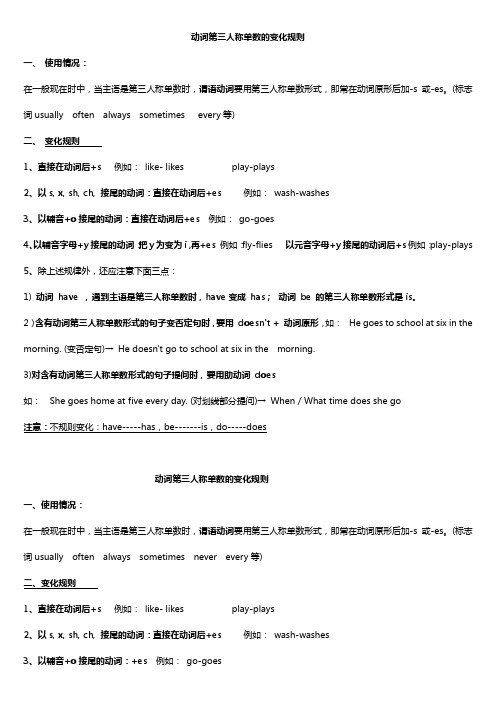
动词第三人称单数的变化规则一、使用情况:在一般现在时中,当主语是第三人称单数时,谓语动词要用第三人称单数形式,即常在动词原形后加-s或-es。
(标志词usually often always sometimes every等)二、变化规则1、直接在动词后+s 例如:like- likes play-plays2、以s, x, sh, ch, 接尾的动词:直接在动词后+es 例如:wash-washes3、以辅音+o接尾的动词:直接在动词后+es 例如:go-goes4、以辅音字母+y接尾的动词:把y为变为i,再+es 例如:fly-flies 以元音字母+y接尾的动词后+s例如:play-plays5、除上述规律外,还应注意下面三点:1)动词have ,遇到主语是第三人称单数时,have变成has;动词be 的第三人称单数形式是is。
2)含有动词第三人称单数形式的句子变否定句时,要用doesn't + 动词原形,如:He goes to school at six in the morning. (变否定句)→He doesn't go to school at six in the morning.3)对含有动词第三人称单数形式的句子提问时,要用助动词does如:She goes home at five every day. (对划线部分提问)→When / What time does she go注意:不规则变化:have-----has,be-------is,do-----does动词第三人称单数的变化规则一、使用情况:在一般现在时中,当主语是第三人称单数时,谓语动词要用第三人称单数形式,即常在动词原形后加-s或-es。
(标志词usually often always sometimes never every等)二、变化规则1、直接在动词后+s 例如:like- likes play-plays2、以s, x, sh, ch, 接尾的动词:直接在动词后+es 例如:wash-washes3、以辅音+o接尾的动词:+es 例如:go-goes4、以辅音字母+y接尾的动词:把y变为i,再+es 例如:fly-flies 以元音字母+y接尾的动词后+s例如:play-plays5、除上述规律外,还应注意下面三点:1)动词have ,遇到主语是第三人称单数时,have变成has;动词be 的第三人称单数形式是is。
- 1、下载文档前请自行甄别文档内容的完整性,平台不提供额外的编辑、内容补充、找答案等附加服务。
- 2、"仅部分预览"的文档,不可在线预览部分如存在完整性等问题,可反馈申请退款(可完整预览的文档不适用该条件!)。
- 3、如文档侵犯您的权益,请联系客服反馈,我们会尽快为您处理(人工客服工作时间:9:00-18:30)。
动词第三人称单数形式的练习一.写出下列动词的第三人称单数。
drink ________ go _______ stay ________ make ________ look _________ have_______ pass_______ carry ____ come________ watch______ plant_______ fly _______ study_______ brush________ teach_______ wash_______ match _____ guess______ finish_________
二.用括号内动词的适当形式填空。
1.He often ________(have) dinner at home.
2.We _______(not watch) TV on Monday.
3.Nick _______(not go) to the zoo on Sunday.
4.______ they ________(like) the World Cup?
5.What _______they often _______(do) on Saturdays?
6._______ your parents _______(read) newspapers every day?
7.The girl _______(teach) us English on Sundays.
8.She and I ________(take) a walk together every evening.
9.There ________(be) some water in the bottle.
10.Mike _______(like) cooking.
11.They _______(have) the same hobby.
12.My aunt _______(look) after her baby carefully.
13.You always _______(do) your homework well.
14.I _______(be) ill. I’m staying in bed.
15.She _______(go) to school from Monday to Friday.
16.Liu Tao _______(do) not like PE.
17.The child often _______(watch) TV in the evening.
18.Su Hai and Su Yang _______(have) eight lessons this term.
19.I like ____________ (swim).
20.He _________(read) English every day.
21.We _________(go)to school at seven in the morning.
22.Mike________(go)to school at seven in the morning.
23.My mother________(like) ______(go) shopping.
24.I can ________(draw) many beautiful pictures.
25.She_________(make) a model plane.
26.Do you ________(like)_________(run)?
27.Does he_________(like)_________(jump) ?
28.Does Nancy_________(grow)flowers on Saturday ?
29.The teachers________(like)___________(dance).
30.The teacher________(like)____________(dance).
31.The students___________(speak) English in class.
32.The student_________(speak) Chinese after class.
33. Let’s____________and play football . ( go )
34. He_____________ like swimming . ( not )
35. I’m sorry ____________that . ( hear )
36. _________you study English at school ? Yes , I___________. ( do )
37. __________your sister study English at school ? No , she__________ . ( do )
38. I’m _________ better . ( feel )
39. Why__________Tom absent today ? ( be )
三.用所给的人称改写句子
1.I take photos on Sunday. ( Mike)
2.We grow beautiful flowers. (she)
3.They like collecting stamps. (Ben)
4.I listen to music carefully. (my aunt)
5.You like making a model ship. (Helen)
6.We clean the classroom every day. (he)
7.They look after the pandas. (Mr Wang)
8.I draw a tree and some flowers. (Nancy)
9.We go to bed at eight. ( my sister)
10.I read newspapers in the evening. (Mr Green)
四.改句子
1. Do you often play football after school? (肯定回答)
2. I have many books. (改为否定句)
3. Gao Shan’s sister likes playing table tennis (改为否定句)
4. She lives in a small town near New York. (改为一般疑问句)
5. I watch TV every day. (改为一般疑问句)
6. David has got a goal. (改为一般疑问句)
7. We have four lessons.(否定句)
8. Nancy doesn’t run fast (肯定句)
9. My dog runs fast. 否定句:一般疑问句:
10. Mike has two letters for him. 一般疑问句:否定句:
11. I usually play football on Friday afternoon. 否定句: 一般疑问句: 划线提问
12. Su Yang usually washes some clothes on Saturday. 否定句: 一般疑问句: 划线提问:
13. Mingming usually waters the flowers every day 否定句: 一般疑问句: 划线提问
14. Tom does his homework at home. 否定句: 一般疑问句: 划线提问。
